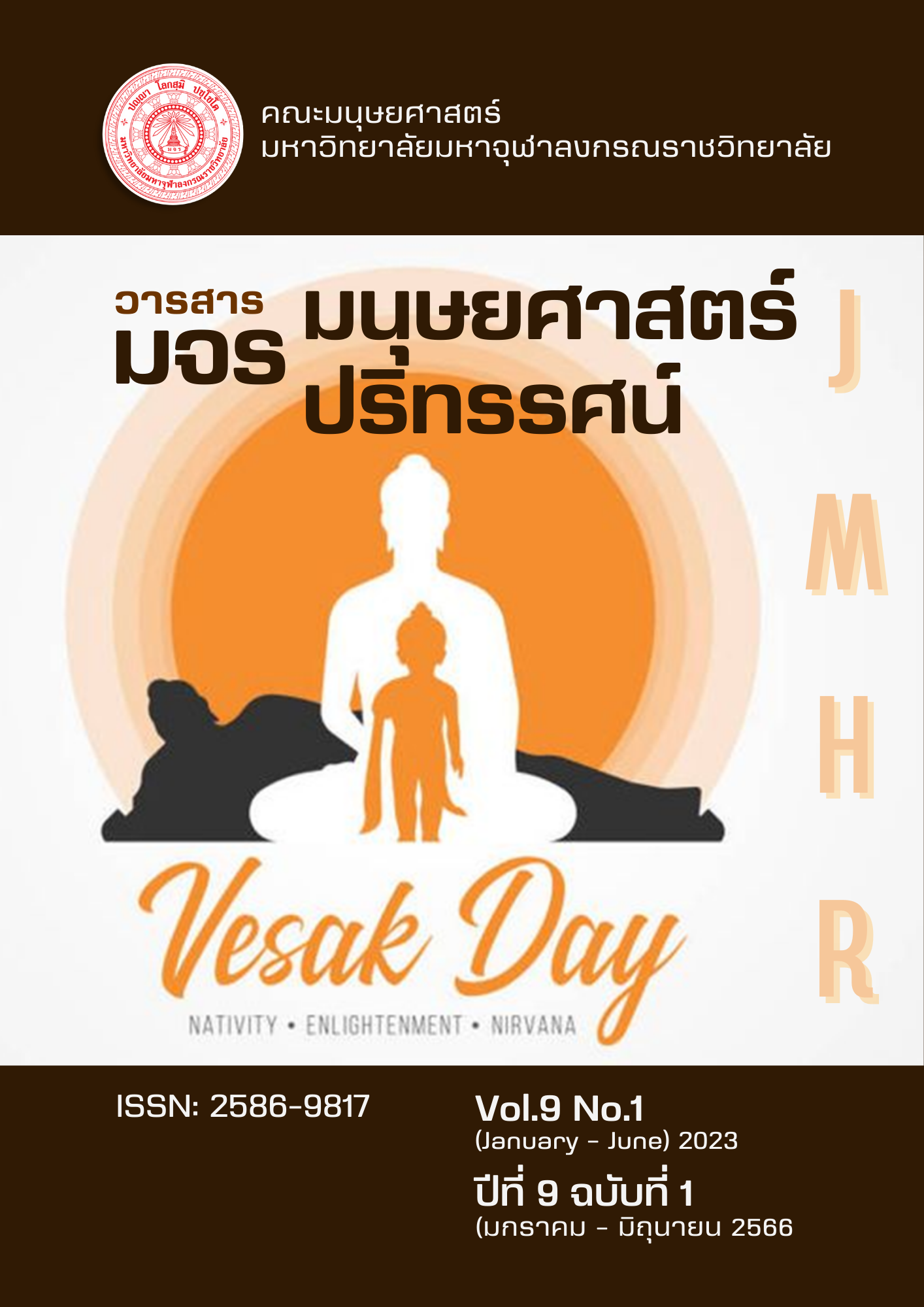การพัฒนาปัญญารู้คิดแนวพุทธจิตวิทยาเพื่อสุขภาวะที่ดีในสถานการณ์โควิด-19
คำสำคัญ:
พุทธจิตวิทยา, การพัฒนาปัญญา, สุขภาวะที่ดีบทคัดย่อ
จากสถานการณ์ไวรัสโควิค 19 แพร่ระบาดทั่วโลก ทำให้ผู้คนและองค์กรต่าง ๆ ต้องหันกลับมาทบทวนทำความเข้าใจเกี่ยวกับพลวัตทางโลกและวิถีชีวิตกันมากขึ้นเราท่านที่เป็นมนุษย์ปุถุชนทั่วไป ไม่อาจหลีกเลี่ยงการเผชิญเหตุการณ์วิกฤตในชีวิตได้ ไม่ว่าจะภัยธรรมชาติ วินาศกรรม โรคภัย ไข้เจ็บหรือโรคระบาดที่เกิดขึ้นแพร่กระจายทั่วโลกในขณะนี้ แต่มนุษย์เราสามารถเลือกที่จะพัฒนาหรือสรรหาปัจจัยในการปกป้องให้เกิดขึ้น เพื่อให้สามารถเผชิญและฟันฝ่าผ่านพ้นเหตุการณ์วิกฤติต่าง ๆ ในชีวิตได้ด้วยปัญญารู้คิดและจิตใจที่เข้มแข็ง ด้วยการปรับวิธีคิดใช้วิกฤติที่เกิดเปลี่ยนเป็นโอกาสในการเรียนรู้เพื่อพัฒนาปัญญาและจิตใจให้งอกงามยิ่งขึ้นไปเพื่อให้มีสุขภาวะที่ดีตามแนวพุทธจิตวิทยาที่มุ่งเน้นการเรียนรู้วิชาการ และการนำไปปรับใช้ เพื่อการปฏิบัตินำไปสู่เป้าหมายการมีสุขภาวะและคุณภาพชีวิตที่ดีมีความสัมพันธ์อันเหมาะสมกลมกลืนในการดำเนินชีวิตของบุคคลกับสภาพแวดล้อม ทางสายกลาง (มัชฌิมาปฏิปทา) ตามแนวพุทธจิตวิทยาโดยการฝึกพัฒนาปัญญารู้คิด ให้รู้เท่าทันสถานการณ์รอบตัว เข้าใจตนเอง (โยนิโสมนสิการ) มากกว่าการพึ่งพาอาศัยวัตถุภายนอก ซึ่งเป็นแนวทางการพัฒนาชีวิตของตนให้มีสุขภาวะทีดีและยั่งยืน การพัฒนาปัญญารู้คิดให้มีความเข้าใจในการสรรค์สร้างสุขภาวะในสถานการณ์ต่าง ๆ ได้ ซึ่งในบทความนี้ประกอบด้วยหลักสำคัญทางพุทธรรม คือ ปัญญา 3 คือ สุตมยปัญญา จินตามยปัญญา ภาวนามยปัญญานำมาเป็นกระบวนการพัฒนาแบบบูรณาการตามแนวทางพุทธจิตวิทยา ซึ่งมีวิธีการที่จะพัฒนาปัญญาให้เกิดการรู้ทางดำเนินชีวิตที่ดีงามและมีความสุข การรู้จักเลือกหาแหล่งความรู้ และแบบอย่างที่ดีมีความมุ่งมั่นพัฒนาตนให้เต็มศักยภาพ การปรับเจตคติและค่านิยมให้เหมาะสมกับการดำเนินชีวิตที่ดีงาม มีสติรู้คิดใช้ปัญญาแก้ปัญหา และพึ่งพาตนเองให้รอดพ้นจากวิกฤตได้อย่างปลอดภัยและยั่งยืน
เอกสารอ้างอิง
กลุ่มบริการและเผยแพร่ข้อมูลสถิติ กองสถิติพยากรณ์ สำนักงานสถิติแห่งชาติ. (2563). การสำรวจผลกระทบจากสถานการณ์การแพร่ระบาดของโรคโควิด 19 ด้านเศรษฐกิจ. สืบค้น 25 มิถุนายน 2565, จาก http://ittdashboard.nso.go.th/img/covid/result_COVID-eco.pdf
จักรพรรณ วงศ์พรพวัณ และคณะ. (2559). การพัฒนาปัญญาตามแนวพุทธจริยศาสตร์ของ สำนักปฏิบัติธรรมวัดโพธิ์บ้านโนนทัน ตำบลในเมือง อำเภอเมือง จังหวัดขอนแก่น. วารสารธรรมทรรศน์, 16(3), 143-154.
ฤทัยรัตน์ ชิดมงคล และสมยศ ชิดมงคล. (2560). การคิดเชิงระบบ:ประสบการณ์สอนเพื่อพัฒนาการคิดเชิงระบบ. วารสารครุศาสตร์, 45(2), 290-224.
วัฒน์ บุญกอบ. (2565). คิดให้เกิดปัญญา. สืบค้น 20 มิถุนายน 2565, จาก https://www.gotoknow.org/posts/73633.
โศภิต นาสืบ. (2564). รายงานผลการทบทวนผลกระทบเชิงเศรษฐกิจและสังคมจากการระบาดของโรคโควิด-19 ในระดับโลกและในประเทศไทย. สืบค้น 20 มิถุนายน 2565, จาก http://thaincd.com/2016/media-detail.php?id=14100&tid=31,29,1-001-005&gid=1-015-005
สมเด็จพระพุทธโฆษาจารย์ (ป.อ. ปยุตฺโต). (2546). วิธีคิดตามหลักพุทธธรรม (พิมพ์ครั้งที่ 9). กรุงเทพฯ: ธรรมสาร.
“_______”. (2557). สุขภาวะองค์รวมแนวพุทธ (พิมพ์ครั้งที่ 35). นครปฐม : วัดญาณเวศกวัน.
เสาวณี จันทะพงษ์ และเจริญชัย เอกมาไพศาล. (2564). ผลกระทบและการปรับตัว (Resilience) ของผู้ประกอบการธุรกิจโรงแรมและ ร้านอาหารช่วงโควิด-19: วิเคราะห์จากหลักคิด Outside-In. สืบค้น 20 มิถุนายน 2565, จาก https://www.bot.or.th/Thai/ResearchAndPublications/DocLib_/Article_26Oct2021.pdf
ดาวน์โหลด
เผยแพร่แล้ว
รูปแบบการอ้างอิง
ฉบับ
ประเภทบทความ
หมวดหมู่
สัญญาอนุญาต
ลิขสิทธิ์ (c) 2023 วารสาร มจร มนุษยศาสตร์ปริทรรศน์

อนุญาตภายใต้เงื่อนไข Creative Commons Attribution-NonCommercial-NoDerivatives 4.0 International License.






